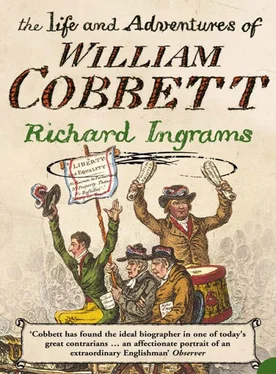Cobbett was supremely confident in his future. By the end of 1805 the circulation of the Register had reached four thousand – a very high figure for these times. In the meantime he had launched a new publication, Cobbett’s Parliamentary Debates (the original of today’s Hansard, named after the printer Cobbett eventually sold the business to). Carried away by his popularity, he felt sure enough of his prospects to expand. Shortly after buying his Botley house he bought a neighbouring farm for his brother and began negotiating the purchase of a farm for himself. Eventually he was to take on an estate of over eighty acres, on which he farmed and planted thousands of trees. ‘I have planted 20,000 oaks, elms and ashes besides about 3000 fir trees of various sorts,’ he wrote to his brother-in-law Ian Frederick Reid serving in Wellington’s army in the Peninsula. ‘How everybody laughed,’ his daughter Anne remembered, ‘at his planting such little bits of twigs at Botley.’ But although Cobbett took great aesthetic pleasure in trees, he regarded them always as a commercial venture, convincing himself that they were a valuable investment for his children and ignoring his wife’s insistence that he would be better off growing crops ‘instead of burying the money on the land with trees which he would never see come to perfection’.
It is here at Botley that we get for the first time a lengthy description of Cobbett and his family from an independent observer, and it is almost with a feeling of relief that the biographer finds it confirming Cobbett’s own view of himself and his achievements. Mary Russell Mitford was a girl of about eighteen when she visited Botley with her father Dr George Mitford, man-about-town and ruddy-faced old rogue who had changed his name from Midford to make himself sound more grand. Mitford, who combined radical opinions with social snobbery, was a compulsive gambler who quickly squandered his rich wife’s fortune as well as the £20,000 his daughter won on the Irish lottery at the age of four. Still, as with Little Nell and her grandfather in The Old Curiosity Shop , she remained devoted to her father until his death at the age of eighty, despite being plagued by money worries even after the great success of her book Our Village (1832) describing life in Three Mile Cross near Reading, where she lived in later years with her dissolute parent.
Dr Mitford was, for a time, a close friend of Cobbett. He mixed with a number of politicians in London, but more importantly he shared with Cobbett a love of hare-coursing and like him kept a kennel full of greyhounds. Mary remembered:
He [Cobbett] had at that time [about 1806] a large house at Botley, with a lawn and gardens sweeping down to the Burlesdon River which divided his territories from the beautiful grounds of the old friend, where we had been originally staying, the great squire of the place. His own house – large, high, massive, red, and square and perched on a considerable eminence – always struck me as being not unlike its proprietor … I never saw hospitality more genuine, more simple or more thoroughly successful in the great end of hospitality, the putting of everybody at ease. There was not the slightest attempt at finery or display or gentility. They called it a farm-house and, everything was in accordance with the largest idea of a great English yeoman of the old time. Everything was excellent, everything abundant, all served with the greatest nicety by trim waiting-damsels: and everything went on with such quiet regularity, that of the large circle of guests not one could find himself in the way. I need not say a word more in praise of the good wife … to whom this admirable order was mainly due. She was a sweet motherly woman; realising our notions of one of Scott’s most charming characters, Ailie Dinmont, in her simplicity, her kindness, and her devotion to her husband and her children.
At this time William Cobbett was at the height of his political reputation; but of politics we heard little, and should, I think, have heard nothing, but for an occasional red-hot patriot who would introduce the subject, which our host would fain put aside and get rid of as soon as possible. There was something of Dandie Dinmont about him, with his unfailing good humour and good spirits – his heartiness, his love of field sports, and his liking for a foray. He was a tall, stout man, fair, and sunburnt, with a bright smile and an air compounded of the soldier and the farmer, to which his habit of wearing an eternal red waistcoat contributed not a little. He was I think the most athletic and vigorous person that I have ever known. Nothing could tire him. At home in the morning he would begin by mowing his own lawn, beating his gardener Robinson, the best mower, except himself, in the parish, at that fatiguing work.
Cobbett was also a keen devotee of rural sports. Besides hare-coursing, for which he kept a huge army of dogs – thirty or forty pedigree greyhounds, pointers, setters and spaniels – hunting was another passion. ‘A score or two of gentlemen,’ he wrote, ‘riding full speed down a hill nearly as steep as the roof of a house, where one false step must inevitably send horse and rider to certain death, is an object to be seen nowhere but in England.’ Boxing and wrestling helped to preserve the strength and spirit of the working man, Cobbett being convinced during this period that an evil alliance of government ministers and Methodists was trying to eliminate such sports in order to make the ‘lower orders’ weak and compliant. Boxing matches attracted big crowds: ‘They tend to make the people bold, they tend in short, to keep alive even amongst the lowest of the people, some idea of independence.’
Another Cobbett favourite was the now forgotten ‘sport’ of single-stick. Two combatants, each with a wooden cudgel, each with an arm tied behind his back, would attempt to break their opponent’s head by drawing an inch of blood from his skull. He explained in a letter to William Windham: ‘The blows that they exchange in order to throw one another off their guard are such as require the utmost degree of patient endurance. The arms, shoulders and ribs are beaten black and blue and the contest between the men frequently lasts for more than an hour.’
Cobbett, who encouraged his young sons to engage in this so-called game, invited Windham to attend a grand single-stick competition which he organised in Botley in October 1805, and which attracted crowds of about five thousand people from all over the country. A first prize of fifteen guineas and a gold-laced hat was offered, and the event was such a success that it was repeated the following year, when even more people came, and the prize was increased to twenty guineas and the hat. ‘The whole village was full,’ Cobbett wrote. ‘Stages in the form of amphitheatres were erected against the houses and seats let to the amount of thirty or fifty pounds. Every gentleman round the country was there.’
The conventional view of Cobbett is of a man who was a Tory in his youth and who became a radical in later life, but, as usual, it is not as simple as that. Cobbett’s early American journalism was informed not so much by his political inclinations as by the simple patriotism of a man who disliked to see his country run down by foreigners. Nor was he ever in sympathy with the advocates of violent revolution or, for that matter, those whose politics were based on abstract theorising rather than, as in his own case, a practical examination of the situation. There was no ‘road to Damascus’ experience in Cobbett’s life to explain his conversion to radicalism. Instead a gradual sequence of events, culminating in his imprisonment in 1810, fundamentally altered his view of politics and the social scene. It was a repetition, on a grander scale and over a longer period, of his army experiences. In both cases he had become involved with institutions of which initially he entertained good opinions and high hopes. But the more he found out – as always with Cobbett, from his personal study and investigation – the more disillusioned he became. And in both cases it was the discovery of corruption, generally accepted as a way of life, that most roused his indignation.
Читать дальше











